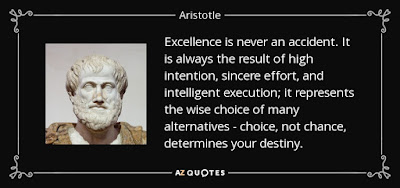One of the most important concepts Aristotle had was believing that to be good, one could not just decide one day that they were going to be good instantly. In order to achieve what Aristotle called virtues, one would have to make a habit of performing differently. Think of it as playing a sport. Even if one is very talented at playing Soccer, no one can immediately hop onto the field and start winning. One has to practice over and over again to get good at dribbling, shooting, passing, etc., to become great at it, just as one must practice patience or friendliness every day for it to become a habit. Aristotle says that once one firmly establishes these virtues in their day to day life, it will be hard to ever forget them.
Just as Aristotle once said that, "One swallow does not make a Summer," a couple of happy moments in one's life does not mean they have a happy and good life. He believed that instead one had to achieve Eudaimonia, a state of being that is much better than it is pronounced. Eudaimonia implies reaching a state of true happiness, a state that goes beyond the fleeting moments of happiness that one would achieve at, say, a party. Additionally, Aristotle's idea of true happiness does not stem from feeling in a great mood all the time. Aristotle believes that Eudaimonia is the totality of all one has accomplished in life.
Aristotle says that even if one feels in a good mood for the majority of their lifetime, they will not experience true happiness until their way of living and the totality of all they have done is good. His form of happiness is much more objective than the normal view, as it is based more on events than on feeling. Say that one has created a beautiful castle and that they die while the castle is still constructed, but that the castle was destroyed soon after the creator's death. A normal person would say that the creator had lived a good and happy life, since they will not know that their castle was destroyed, but Aristotle would say that the destruction of that castle would affect the creator's Eudaimonia. This view might not seem too optimistic, as it opens up the possibility of events outside of one's own control to ruin their happiness. However, Aristotle says that if one can achieve the above virtues in their day-to-day lives, then they will almost certainly obtain a truly happy life.



No comments:
Post a Comment
Note: Only a member of this blog may post a comment.